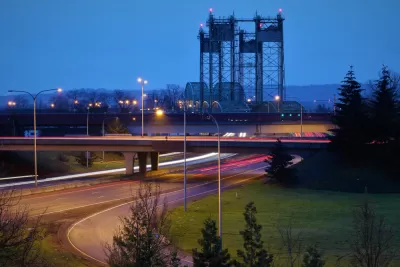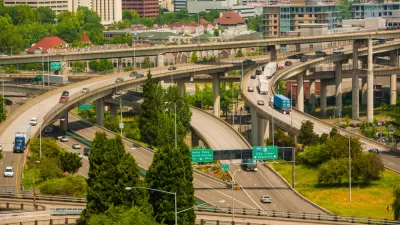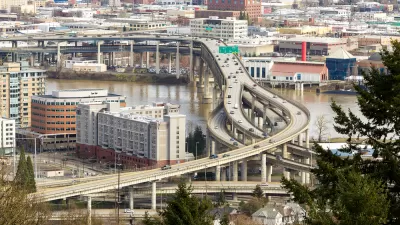The Pacific Northwest's Portland-Vancouver metropolitan area is studying options to add congestion pricing to one or two interstates.

"Oregon's transportation funding bill, House Bill 2017, signed by Gov. Kate Brown (D) last August, does lots more than just add a ten cents-per-gallon gas tax over six years. While the first-of-its-kind bicycle tax garnered lots national attention, a congestion pricing program proposed for the Portland metropolitan area could potentially be far more groundbreaking.
Unlike the $15 bicycle excise tax, which takes effect June 2, congestion pricing of I-205 and/or I-5 could take as long as a decade to implement. However, the Oregon Department of Transportation (ODOT) must submit its recommendation(s) to the Federal Highway Administration (FHWA) by Dec. 31 on which tolling option to pursue.
According to ODOT, "As part of the Keep Oregon Moving legislation (HB 2017), the Oregon Transportation Commission (OTC) established a Portland Region Value Pricing Policy Advisory Committee to guide ODOT throughout the value pricing feasibility analysis." [Value pricing and congestion pricing are essentially synonymous.]
The State Legislature directed the OTC to seek approval from the Federal Highway Administration no later than December 31, 2018. If FHWA approves, the OTC is required to implement value pricing.
At Monday's meeting of the Portland Metro Area Value Pricing Advisory Committee, the WSP, USA Inc. (formerly Parsons Brinckerhoff) consultants unveiled their three recommendations, reports Andrew Theen for The Oregonian on May 14.
Significantly, all three call for tolling the entire roadways, which, if accepted by the OTC, would be a huge change from the current practice of adding one or two express or high occupancy toll lanes in each direction to existing interstates.
Theen describes the three recommendations, in order, that are described in greater detail in the 149-page Portland Metro Area Value Pricing Feasibility Analysis [pdf], prepared by the Portland office of WSP, dated May 7.
- Toll all I-5 lanes between Multnomah Boulevard and Northeast Going Street
- Consider tolling all lanes on I-205 at the Abernethy Bridge
- Toll all lanes of both I-205 and I-5
"Final recommendations will come in late June at the group’s last meeting," adds Theen.
View from the north bank of the Columbia River
"The 25-member advisory committee includes three members from Southwest Washington, including City of Vancouver Mayor Anne McEnerny-Ogle," notes Vancouver's webpage on the Portland Area Value Pricing Feasibility Study.
Columbian staff writer Katy Sword also reported on Monday's meeting of the advisory committee.
“I’m pleased that Concept A was not recommended as it would implement a toll that disproportionately impacts Southwest Washington residents and commuters without providing commensurate benefits,” said Vancouver Mayor Anne McEnerny-Ogle.
Sword notes in her April article that the advisory committee meets next on June 24. "The Oregon Transportation Commission meets July 12 to begin discussing its recommendation."
According to the Community Engagement summary report [pdf] dated May 11, "The OTC will submit a report to the Federal Highway Administration (FHWA) by the end of December 2018."
The timeline for next steps after 2018 depends on direction from the FHWA. Additional work from 2019 onward is likely to include additional public outreach; environmental, traffic and revenue analysis; and the development of an implementation plan.
Adding tolls to all lanes of an existing interstate highway, as opposed to adding toll lanes, is prohibited. States must request waivers from the FHWA. Indiana and Connecticut are pursuing that path.
Hat tip to IBTTA Smart Brief.
FULL STORY: $300 million a year from I-5, I-205 tolls? New details on tolling options

Planetizen Federal Action Tracker
A weekly monitor of how Trump’s orders and actions are impacting planners and planning in America.

Restaurant Patios Were a Pandemic Win — Why Were They so Hard to Keep?
Social distancing requirements and changes in travel patterns prompted cities to pilot new uses for street and sidewalk space. Then it got complicated.

Maui's Vacation Rental Debate Turns Ugly
Verbal attacks, misinformation campaigns and fistfights plague a high-stakes debate to convert thousands of vacation rentals into long-term housing.

In California Battle of Housing vs. Environment, Housing Just Won
A new state law significantly limits the power of CEQA, an environmental review law that served as a powerful tool for blocking new development.

Boulder Eliminates Parking Minimums Citywide
Officials estimate the cost of building a single underground parking space at up to $100,000.

Orange County, Florida Adopts Largest US “Sprawl Repair” Code
The ‘Orange Code’ seeks to rectify decades of sprawl-inducing, car-oriented development.
Urban Design for Planners 1: Software Tools
This six-course series explores essential urban design concepts using open source software and equips planners with the tools they need to participate fully in the urban design process.
Planning for Universal Design
Learn the tools for implementing Universal Design in planning regulations.
Heyer Gruel & Associates PA
JM Goldson LLC
Custer County Colorado
City of Camden Redevelopment Agency
City of Astoria
Transportation Research & Education Center (TREC) at Portland State University
Camden Redevelopment Agency
City of Claremont
Municipality of Princeton (NJ)




























